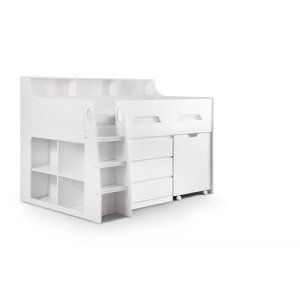10 Pinterest Accounts To Follow About Bunks
Bunks: The Versatile Space-Saving Solution for Modern Living
In today's fast-paced world, where urban home are shrinking and the demand for versatility and practicality is increasing, bunks have emerged as a popular solution. Bunks are not simply a type of bed; they represent a sophisticated approach to making the most of space, promoting social interaction, and supplying comfortable sleeping arrangements. This short article will check out the numerous types of bunks offered, their advantages, and how they can transform both small and big living spaces.
Comprehending Bunks: What Are They?
Bunks, frequently referred to as bunk beds, are 2 or more beds stacked on top of each other. They are created to conserve floor space, making them ideal for kids's rooms, hostels, and even adult living situations. Bunk Bed Near Me are available in various styles and setups, from conventional models to modern-day, designer interpretations.
Kinds of Bunks
Kind of Bunk
Description
Twin-over-Twin
Two twin beds stacked on top of each other. Perfect for kids sharing a space.
Twin-over-Full
A twin bed on the top and a bigger complete bed on the bottom. Great for accommodating visitors.
Full-over-Full
Two full-sized beds stacked together. Perfect for older children or adults.
L-Shaped Bunk Bed
Beds are organized in an L shape, enabling a corner positioning and added space beneath.
Loft Beds
Just the top bunk is present, leaving space for a desk, sofa, or storage below.
Triple Bunk Beds
Three beds stacked vertically, excellent for maximizing vertical space.
Advantages of Using Bunks
Space Efficiency: Bunks are created to use vertical space, making them perfect for little bedrooms or houses where floor space is restricted.
Affordable: Investing in a bunk bed can be more economical than purchasing numerous separate beds, particularly for growing households or those with regular guests.
Versatile Designs: Many bunks come with add-ons, such as desks, storage drawers, or futons, enabling flexible usage of the location.
Social Interaction: Bunk beds invite sociability among siblings and buddies, cultivating a sense of connection.
Creative Use of Space: Bunk beds motivate imagination in space design, enabling playful themes and vibrant design that can make a bedroom feel distinct and welcoming.
Practical Considerations
Height Limitations: When choosing a bunk bed, it is necessary to think about the height of the ceiling in the space. Procedure the space to guarantee there is sufficient clearance above the top bunk for security and comfort.
Weight Restrictions: Each bunk has a specific weight limit. Moms and dads must examine the weight of those utilizing it, especially in the case of adults or heavier adolescents sharing the bed.
Security Features: Features such as guardrails, sturdy ladders, and security accreditations are important for ensuring the bunk bed's security, especially for more youthful users.
Bunks for Various Living Situations
Family Homes
In family homes, bunks provide a useful service for brother or sisters sharing a space or accommodating sleepovers. Bunk beds can be stylishly incorporated into a child's space while supplying adequate space for play.
Hostels and Vacation Rentals
For hostels and vacation rentals, bunk beds optimize sleeping arrangements without compromising convenience. Such setups offer an economical way to accommodate a bigger variety of visitors.
College Dormitories
In college dormitories, bunks assist maximize the limited square footage offered, allowing for more room to mingle and study.
Studio apartments
In small city homes, lofted bunk beds develop extra space for living areas, work spaces, or storage, making life more workable in compact environments.
Maintenance and Care of Bunks
Preserving a bunk bed is essential for ensuring its longevity. Here are a few suggestions:
Regular Inspections: Check for any loose screws or bolts and tighten them as necessary.
Cleanliness: Dust and tidy the bunks regularly to avoid allergens and make sure a tidy sleeping environment.
Bed mattress Care: Use a quality mattress protector to keep health and extend the life of the bed mattress.
Age Appropriateness: Upgrade to a bigger, more durable bunk as children grow or when the current arrangement no longer satisfies the needs of its residents.
Frequently Asked Questions (FAQs)
1. Are bunk beds safe for kids?
Yes, bunk beds can be safe for kids if they are built with security features like guardrails and a steady ladder. Constantly supervise younger children when they are utilizing bunk beds.
2. What age is suitable for a child to sleep on the top bunk?
Many manufacturers suggest that children under the age of six must not sleep on the upper bunk due to safety concerns.
3. How much weight can bunk beds typically hold?
Weight capabilities differ based on the style and products but usually vary from 200 to 400 pounds. Constantly examine the producer's standards.
4. Can bunk beds be separated into 2 single beds?
Lots of bunk beds are developed to be convertible, enabling them to be separated into two private beds. It's necessary to check the product specs before buying.
5. What kind of mattress is best for a bunk bed?
A medium-firm bed mattress is typically advised as it provides adequate support without being too heavy or soft, which can present security issues.
Bunks are more than just beds. They are ingenious space-saving services that deal with the needs of modern-day living. With various styles offered, they offer convenience and functionality for households, visitors, and individuals alike. By focusing on security and maintenance, owners can guarantee that their bunk beds end up being a cherished part of their living areas for several years to come. Whether for Childrens Bunk Beds UK or accommodating visitors, bunk beds use a trendy and useful service to the challenge of restricted space.
